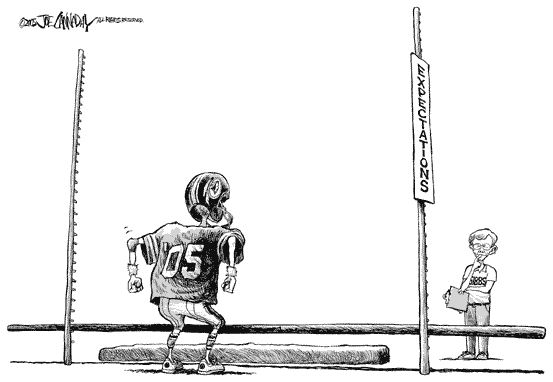To most people, the half-full or half-empty question relates to whether a person tends to be pessimistic or optimistic in their views of events. I always tended to believe that the question was a lot more fluid than the answers it tended to generate. In the course of an ordinary day, anyone can swing from one to the other. Generally and curiously, I find that people tend to be more glass half full (optimistic), after a tragedy or an event where the loss or the outcome could have been worse. For example if armed bandits rob you, you are thankful that they did not shoot you. On the other hand, when you enjoy some good fortune but you feel like the outcome could have been better, your outlook is generally half-empty.
The game show “Deal or No Deal” uses this quirk in people to ensure that 80 percent of their constants walk out of there losers. You see, winning a VW when there was the possibility you could have won a Benz, leaves most people with a sense of loss regardless of the fact that neither vehicle was a guaranteed get when they started out. The other curious thing about the way we view events, is that our views of our own fortune is colored by the relative good or bad fortune of other people. Watching the Joneses get richer would give most people a perpetual glass half full view of life even if you are not doing too badly yourself. Basically; we allow someone else’s circumstances to distort our view of our own self worth and most times this is without knowing the mitigating reasons for the other person’s success.
This displeasure could usually carry over into the all other areas of ones personal life, even into areas were your lot really is good, like marriage or your job or your friendships. To get clarity and to be able to balance out how we view things we will need to undergo a true paradigm shift (a change of position so profound, relative to our original position as to completely change our interpretation of events).
Experiences like finding God or surviving a truly harrowing experience tends to leave a lasting change in people where they are always thinking they are blessed. NBA basketball great Tracy Mcgrady returned from a trip to Somalia, with a completely new understanding to the words misery and hopelessness. For him, someone, who always thought that the worse that could happen was growing up poor and black in America, he experienced a paradigm shift that things could have been be a lot worse.
Here are some answers to the question Half Full or Half Empty? From Wiki answers
• Answer: Neither, It is always full. It may be filled with 50% of water and 50% of air, or any variation of competing percentages, but it is always full of something even if it looks empty, as it could be FULL of air.
• Answer: That is relative. Depends whether you are drinking or pouring.
• Answer: Logical point of view, the cup is half-full. A glass cannot be half-empty because half of nothing is still nothing.
• Answer: I think that the cup being half-full or half empty can and should both be looked at as positive viewpoints. For even if the cup is half-empty you have taken in half and you yourself are half-full. So in one sense (half full) you have more to consume, and in the other (half empty) you have consumed already a part of what there is.
• Answer: In Yorkshire they'd say the glass was too blummin' big
• Answer: I do not know how in the first place this could even be asked since your glass was empty to begin with, then it is logically half-full. HOWEVER, if you have filled your glass and drank half of it then it is half-empty so, you can not answer this question without knowing if the glass was completely full before you have stumbled upon it


No comments:
Post a Comment